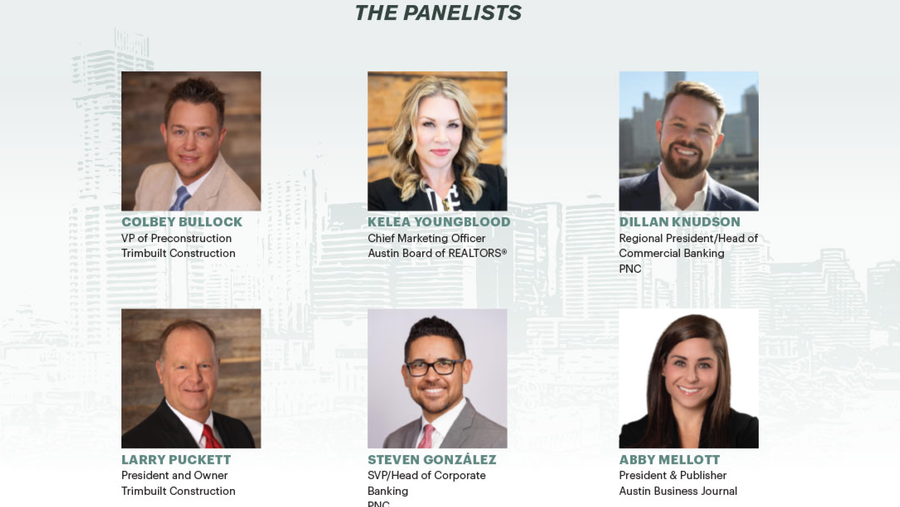
For months now, corporate America has been sounding the alarm bells, but weary consumers don’t need much convincing. Between skyrocketing prices on everything from gasoline to groceries, there’s no doubt about it – pocketbooks are feeling the burn of inflation.
Most tellingly, an interest rate hike, coupled with a contentious political climate – particularly in Texas – have conspired to cool a previously red-hot real estate market here in Austin. Although it may be a thorn in the side for sellers, it’s great news for relocators and the businesses courting them.
The Austin Business Journal sat down with local thought leaders to discuss the concept of economic resilience in Central Texas. What are they doing today to prepare for tomorrow’s uncertain future?
Joining the discussion were Larry Puckett, President/Owner and Colbey Bullock, VP of Preconstruction at Trimbuilt Construction, Inc.; Steven González, SVP/Head of Corporate Banking and Dillan Knudson, Regional President/Head of Commercial Banking at PNC; Kelea Youngblood, Chief Marketing Officer at Austin Board of REALTORS®. Austin Business Journal Market President and Publisher Abby Mellott served as moderator. Additional commentary was provided by Steve Skarnulis, Partner, Cain & Skarnulis PLLC.
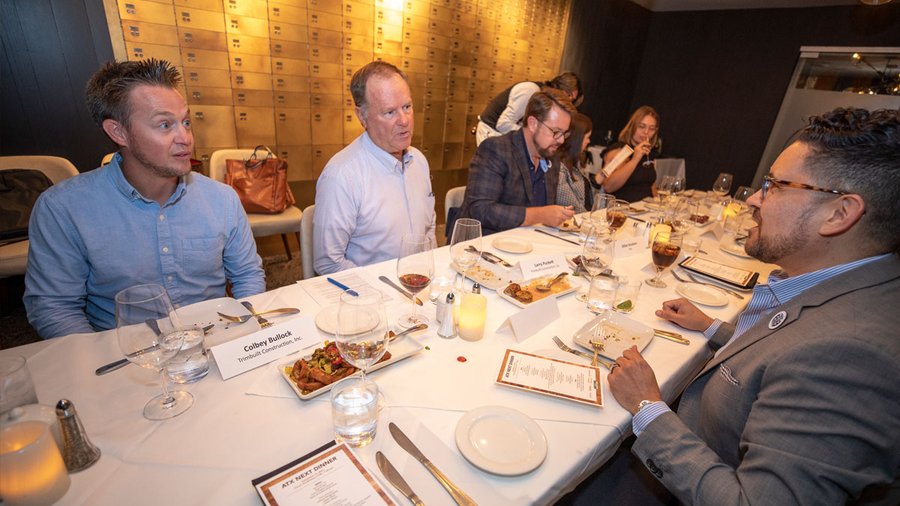
Abby Mellott: How is the changing economy affecting your business? To what degree are you feeling the impact of inflation and increased supply costs?
Larry Puckett: We are definitely feeling it, mostly with fuel costs, because we have a fleet. The biggest challenge I have is, we’ll bid a project and give that price to the client, and then the client is usually over budget because it’s something they budgeted a year ago, or six months ago. So there’s sticker shock, and we end up doing a lot of value engineering to try and get the costs down. What happens is, we’ll spend a month value engineering a project, and then on the back end some of my costs go back up. So we’ve been trying to educate our clients and let them know, “Look, you have to make a decision really, really quickly.” We know that the cost is a lot more than it was a year ago, but what are you going to do? It’s a juggling act for us.
Steve Skarnulis: We specialize in litigation, which can tend to be countercyclical. Often in rough economic times there are more broken business deals and contractual breaches, which keeps us busy. Fortunately for Austin, we are not seeing those indicators so far.
Abby Mellott: So we’ve obviously seen the housing market cool, which I know we agree is ultimately a good thing. How long will this last, and does it align with the rest of the country? What parts of this scenario are unique to Austin, specifically?
Kelea Youngblood: It’s still time to plant your flag. Things are settling. I don’t even know if I would call it cooling. I think it’s just shifting from the heightened housing experience that we’ve all been through these last 36 months, and you know, that was not sustainable–nor was it realistic. From a residential resale standpoint, I think that the Central Texas area is still the place to be, and people are still coming here. There’s a ton of demand and it doesn’t seem to be letting up with the recent job market headlines of incredible companies coming to our area. We are also still seeing international buyers, and that has not let up. Even the airport is talking about direct flights from Asia. It is a good thing for buyers to finally have some leverage in a market that has been holding its breath for the last two years. Although we don’t have a crystal ball to know what the future will hold, I’d say if you want to live here, now is the time.
Abby Mellott: So with that being said, in the midst of this adjustment period in Austin real estate, are we in danger of seeing a larger impact on the local economy at large?
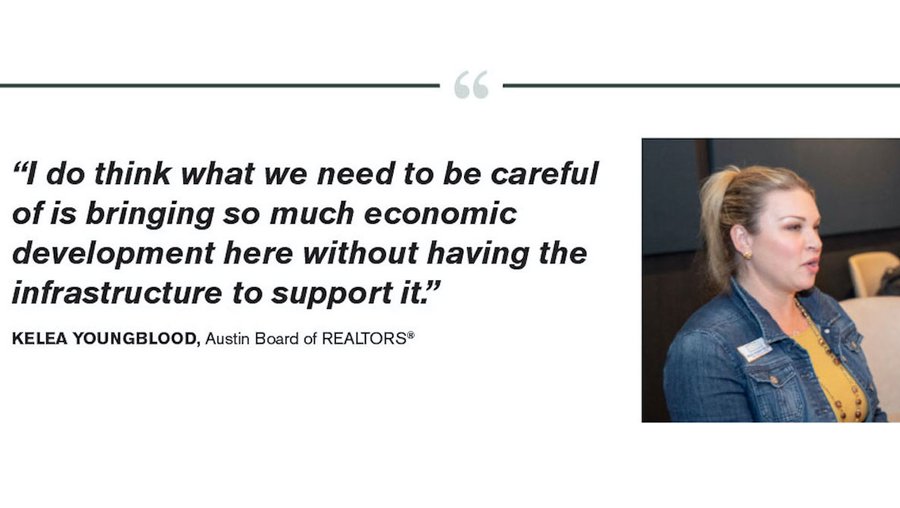
Kelea Youngblood: I do think what we need to be careful of is bringing so much economic development here without having the infrastructure to support it. The economic developers are doing a great job of shining a light on Central Texas, but until we can really provide the infrastructure behind it–including in our surrounding cities – we risk continuing to make the same mistakes that Austin has been making over the last 20 years. We have to concentrate on that, and housing is a big, big part of that. We need affordability, transportation and water.
Dillan Knudson: While you never want to see a decline in value of any economic drivers, an adjustment will just bring more people, right? It’ll bring more businesses, it’ll make us more affordable to more buyers. We don’t want it to happen, but we’re not nervous about it happening when we see adjustments.
Steve Skarnulis: We are not seeing it in the legal market or with our business clients. The feeling we get is a cautious optimism. And for savvy businesspeople, a soft economy is ripe with opportunity.
Abby Mellott: Overall, do you feel like Austin is in a good position to weather an economic downturn?
Larry Puckett: Absolutely, I do. I mean, let’s put this in perspective. You have Samsung coming to town, Dell Children’s Medical Center. You have Elon Musk with Tesla. Ten years ago, we basically had Dell and all the tech companies. In my business, we’re seeing a lot of industrial development, which is a good thing. We have diversified so much, and the city planners have done a good job on that. I have to give a shout out to Opportunity Austin, our Chamber of Commerce. I think they have done a really great job of getting these diverse companies in. Just look at where we are today versus where we were ten years ago. We can handle it.
Dillan Knudson: When you look at the pie chart of companies that have come to Austin over the last 10 years, advanced manufacturing is a huge piece of it. The automotive industry was not a part of our economy 10 years ago. With Tesla here, you’ve got all these automotive parts companies that are coming into town. With the CHIPS Act of 2022, and all the things that are going on in the semiconductor industry here, it’s interesting to see the mix. I think we’re really well-suited to weather the storm.
Kelea Youngblood: Yes. Absolutely. Austin has all the pieces for a resilient economy. While we should embrace economic growth at all levels, we need to remember that people need a place to live. We need to be cognizant of how we are supporting companies of all sizes – not just the big dogs – as they employ folks who live in Austin. We need to continue to talk about the land development code. We can’t bite the entire apple all at once. We’ve got to chew at it. We have to make smart changes and keep chipping away at it so surrounding cities experiencing growth will be able to build on our progress.
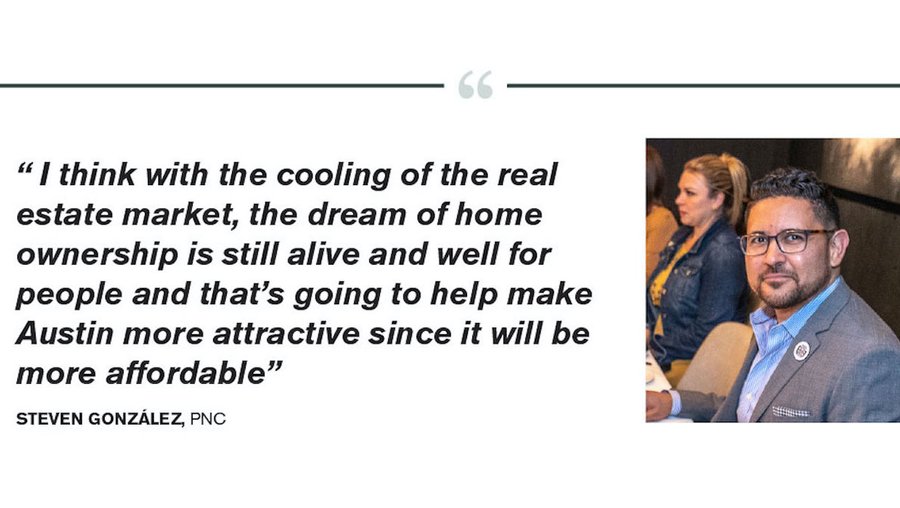
Steven González: Well, I certainly agree with that. I also think that the gravity of some of the Teslas and Samsungs of the world coming to Austin – and the businesses coming in on the periphery to support them–that’s also helping with our job market, our local economy. So I think with the cooling of the real estate market, the dream of home ownership is still alive and well for people and that’s going to help make Austin more attractive since it will be more affordable.
Steve Skarnulis: There can be no better place to ride this out. In fact, growth may very well continue here as businesses leave other, less resilient areas.
Abby Mellott: What’s the most promising business project or initiative underway in Austin right now, and how will it impact our city?
Larry Puckett: Is there anything more impressive than Samsung? It’s the biggest construction site in the history of the nation – 17 billion. I think I read that for the next 10 years, it’s going to bring another $200 million into the surrounding areas. Taylor, get ready.
Kelea Youngblood: Yes, and I think there’s definitely an opportunity for some of these big companies to offer incentives to their employees for housing – vouchers, and things like that. I also think we need to look at ways to transform dead commercial spaces into housing. We need to get creative.
Steve Skarnulis: The incredible projects underway downtown continue to amaze us and attract more business. We have one of the most vital CBDs in the country.
Abby Mellott: Where do you guys think business leaders should focus their energy these days?
Dillan Knudson: I think employee engagement and corporate culture are really important. While work from home seems to have found a permanent place in corporate America, I do believe we need to find ways to collaborate in the office. That means creating an environment that employees want to spend time in. I’m concerned about the development of talent in an environment where they’re not able to spend time around other people. We need to be able to share what we’ve all learned through our careers with new people who are coming up in theirs and be able to support them in the right way. In our office, we try to have as much fun Monday through Friday within our walls as we do at home. We put a premium on culture. On Sunday night, you should be excited to go to work the next morning to collaborate with team members help solve problems for our clients. You should not be stressed out and worried about showing up, and I think that if we do that right, then people are less likely to go looking elsewhere. That’s big for us.
Steven González: I would also like to add, I think business leadership should focus on the community, and how to help the community get together. PNC is really behind the music scene and helping musicians in Austin and trying to keep that culture alive. So I think it’s important for business leaders to find the cause that’s right for them. Obviously it’s changed a lot, but we all want to make sure Austin remains a great place to live.
Dillan Knudson: From a strategic perspective, if you see a tough road ahead, it can be a difficult choice to make changes on how you’re going to manage the growth of your business. From what we’ve seen, for the companies who make those adjustments quickly and early, they’re generally the first ones to come out of it when you’re dealing with a potential downturn. In many cases this is the right approach, as opposed to just waiting and seeing what happens. Being proactive, knowing your business, and doing the things you have to do to protect your business and employees is key.
Steve Skarnulis: I think this is a great time to focus on talent and developing those people. It is a great time to look at attracting new people, and one of the key retention tactics is to coach up the great people you already have.
Abby Mellott: You mentioned earlier about you know, folks helping to build employee housing. Should employers take the lead in civic matters, helping to set a policy since things can’t happen quick enough, in certain instances?
Kelea Youngblood: One hundred percent, especially with regard to housing. They need to be at the table in these discussions so everyone can work together on solutions as they infiltrate our communities. Austin can manage the growth with more density and creative housing solutions in corridors that make sense in our city. There are opportunities for more dense housing with parks and areas for people to work and play and go to school. We have to find the middle ground in order to create more housing for people. There’s nothing more important in my opinion.
Larry Puckett: Education is a big deal. We were talking about this earlier in our office. What are we going to do when we run out of tradesmen? In manufacturing, you can get a robot to build a car, but at some point, what are we going to do when there’s a shortage of craftsmen? In my generation, we pounded home the point – go to college if you want to be successful. Well, I guess maybe we didn’t think that all the way through! We need people building things. We need to shift the narrative about trade school. We need to make it cool – it’s not cool right now.
Colbey Bullock: When Tesla really got going on phase one, I remember one Tuesday they put out a notice for 100 electricians. Then on Friday that week, they sent out another post requesting 200 additional electricians. A week after that, it was 400. So you can imagine what that does for us. It really puts a damper on what we do and eats up all of our labor. So large projects don’t help that at all.
Abby Mellott: Right, and parents need to know their son or daughter can go to a trade school for a shorter period of time and come out immediately and have a full-time job making a very livable wage.
Kelea Youngblood: I’ll take it one step further. Learning a trade is one thing, but learning a trade with business knowledge takes things to another level. Now you can run your own business.
Colbey Bullock: Going to college and looking at the value of that, versus being in a trade – I don’t know how to solve that riddle.
Abby Mellott: It certainly can’t happen overnight, but we’ve got to keep talking about it, for sure. Since the last time we met, some longtime iconic businesses have shuttered their doors, including Lucy in Disguise on South Congress. How do we continue to be an economic powerhouse as we grow, while still remaining true to what makes Austin unique?
Larry Puckett: I don’t think we can stop progress. I like muscle cars, but the old muscle cars got eight miles a gallon and had no AC. They sounded good, and they were awesome to look at, but how can you compare that to the automotive technology we have available today? That’s how I think of progress in Austin. How do you stop it? I don’t think you can.
Dillan Knudson: I think if we look at the heart and soul of the city – if we look at the music scene and the University of Texas, for instance – it’s not like Austin is getting worse with these changes. We’ve all lost iconic venues, but then you’ve also got some new ones. We’ve got Waterloo Greenway Park, which is incredible. ACL Live is like a church of music. It’s great to see the University of Texas get into the SEC. I think that will be great for the city and help shine a light on something that was such a major part of how we got here. But the whole Keep Austin Weird thing? It’s like the weird kid grew up, and it was super cool.
Steve Skarnulis: At ABJ’s Best CEO awards in 2019 Kendra Scott’s acceptance speech focused on how we cannot lose sight of supporting each other in the Austin business community. And that is how we as business leaders can now keep the culture and vibe that we love about Austin. Whether that is supporting old Austin favorites like the Broken Spoke or newer Austin classics like Antonelli’s, that is how we preserve Austin’s flavor.
Abby Mellott: To wrap things up, ABJ will be kicking off 2023 with an Economic Forecast event in January focused on research gathered from our audience this fall. Some of the questions we may ask include “What kind of woes do you anticipate having, specific to your industry?” or “What types of trends do you think we’ll be hearing about in the coming year?” So with that in mind, how do you think business leaders in our community will respond?
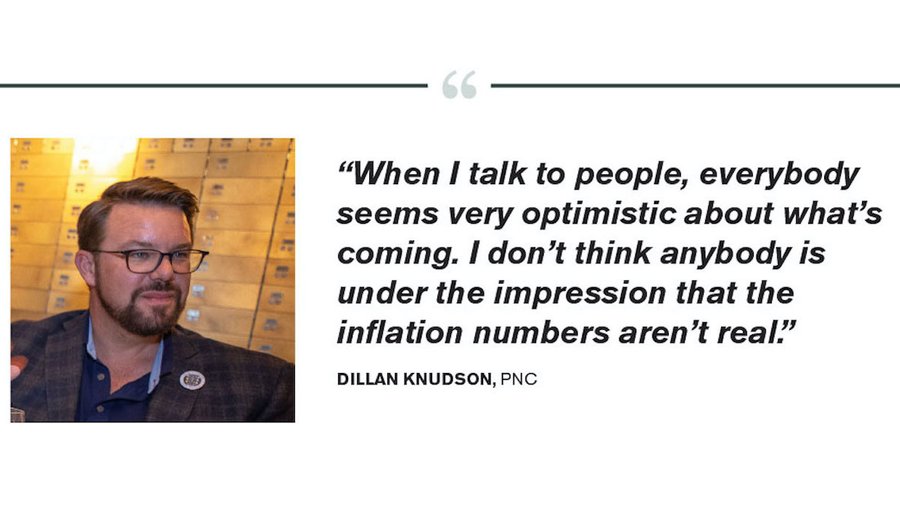
Dillan Knudson: When I talk to people, everybody seems very optimistic about being in Austin. I don’t think anybody is under the impression that the inflation numbers aren’t real. We know costs are going up, we’re seeing it in our industry in interest rates, but everybody seems generally optimistic about being in Austin, about the city growing and the companies that are coming here. I think if you were to ask the economists, they’re anticipating some sort of a slowdown through the end of the year and into the first and second quarter. But if you look at some of those same trend lines, we’re also looking at maybe some interest rate reductions by the mid part of 2023, which is wild to think about. So I think there’s an expectation that there’s going to be some easing in the inflation next year, but regardless Austin is still a great place to live and have a business.
Steven González: Exactly. There’s definitely going to be concerns, but people are still going to feel very fortunate to be living in Austin, Texas–or in Central Texas, generally.
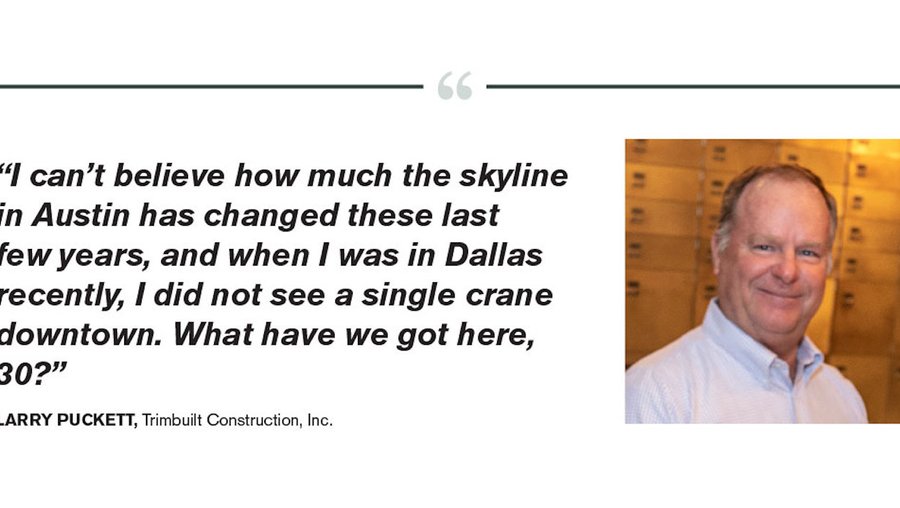
Larry Puckett: I can’t believe how much the skyline in Austin has changed these last few years, and when I was in Dallas recently, I did not see a single crane downtown. What have we got here, 30? What are we going to see in the next 10 years? We’ve got the richest man in the world who lives here, we’re going to have the tallest tower in Texas, and we almost beat Alabama (laughter).
Dillan Knudson: It is a good time to be in Austin. The city is thriving, and you can get as involved as you want to get in in anything that’s going on in the city. You want to be a part of changing what transportation looks like in the city of Austin? You can get involved! There’s plenty of committees. There are plenty of groups who are working on it, and they welcome the help. Do you want to help with affordability? You’re welcome to help. Every time I hear somebody say something that they dislike about our community, I just want to know what they want to do to help us fix it. We live in a city that is very welcoming to ideas, and there’s no pointy elbows in Austin. Nobody shuts the door on you, so I think that’s incredible.
Steve Skarnulis: We will respond with enthusiasm and navigate the rough waters in the near future, with an eye to what is possible with the advantages we have here.